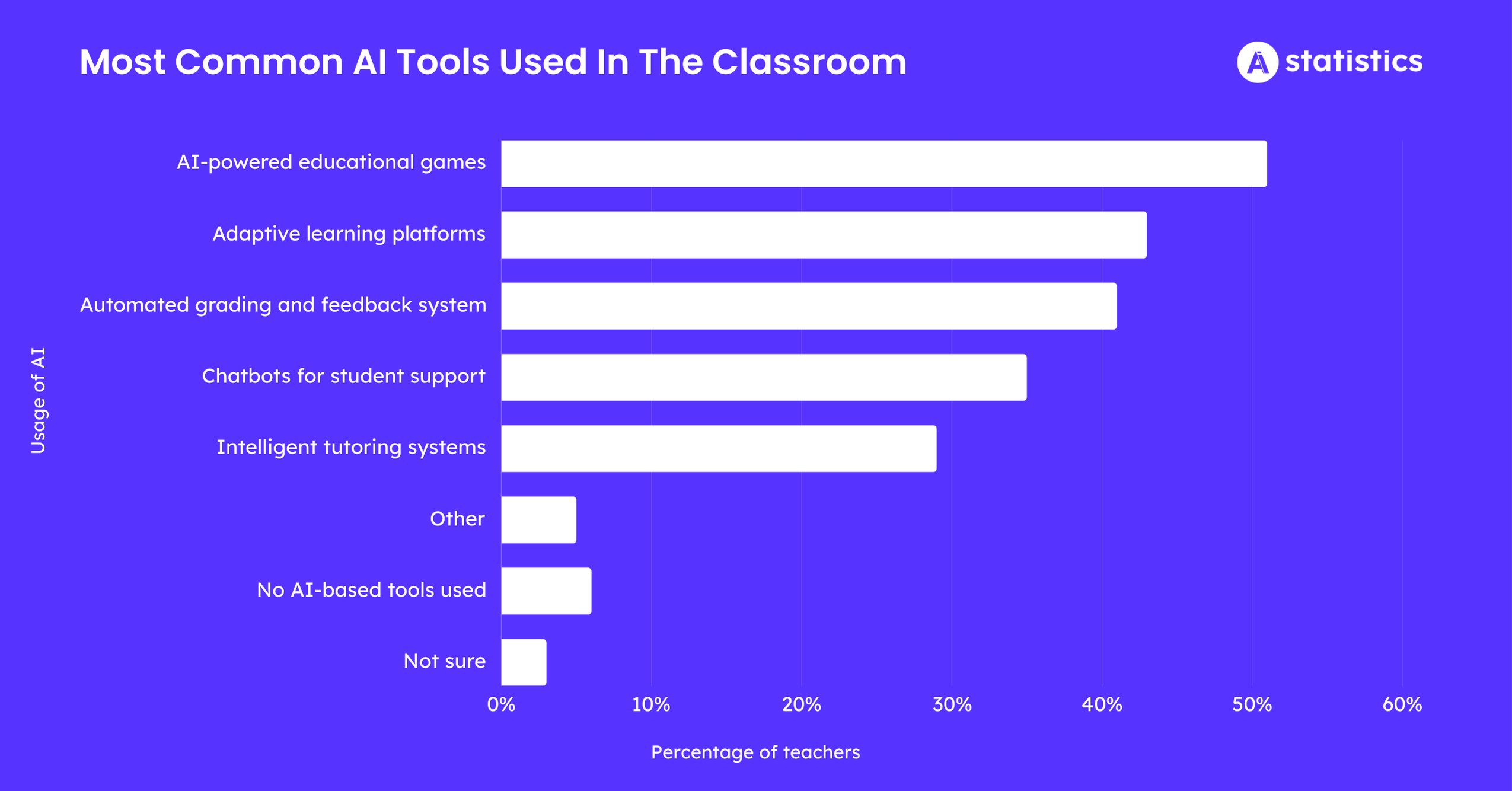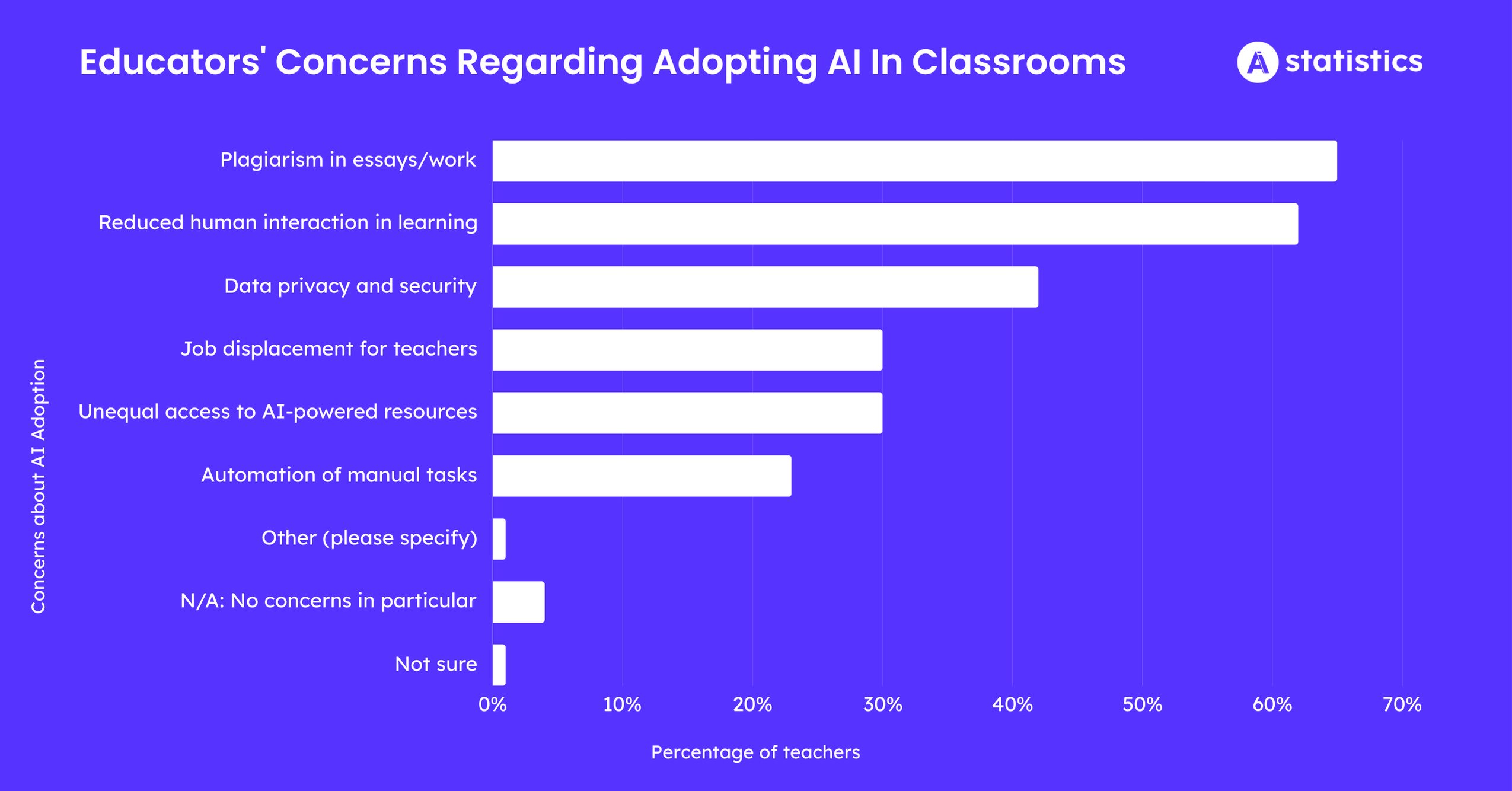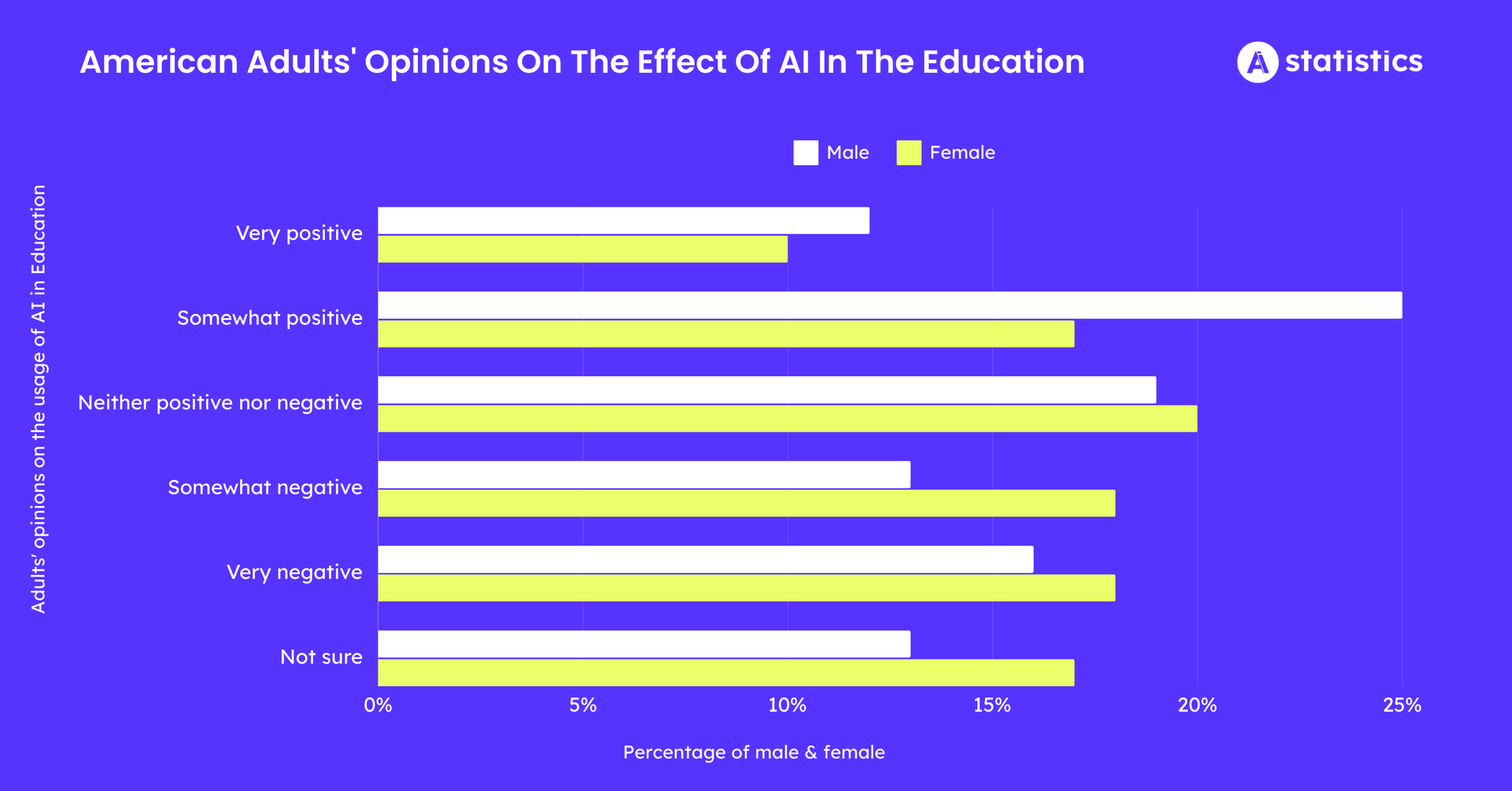The adoption of AI is transforming the education industry, with learning becoming more personalized, engaging, and effective.
Today, 60% of the educators have adopted AI in classrooms, while 44% of the teachers use AI for research.
However, adopting AI has also led to increased concern among teachers regarding its misuse, such as cheating and using it to complete assignments.
Let’s explore AI in education further in this post. I have covered AI in the education market, the adoption of AI in the education sector, the opinions of US adults and educators on AI adoption in education, educators’ concerns regarding its adoption, and more.
AI In Education Statistics 2026 (In A Glimpse)
- AI in Education market is estimated to grow at a CAGR of 37.2% between 2024 and 2032.
- 51% of teachers use AI-powered educational games more often than other AI tools.
- 3 in 5 educators have adopted AI in their classrooms.
- Plagiarism in essay works is a major concern of AI adoption, according to 65% of teachers.
- 33% of adults in the United States stated that AI adoption has negatively impacted the education sector, while 32% stated that it has positively impacted the education sector.
- 60% of teachers believe that AI will be used more widely in the upcoming decade in educational settings.
AI in Education Market Size
AI in Education market was valued at $1.77 billion in 2023.
The market is estimated to grow at a CAGR of 37.2% between 2024 and 2032. Hence, by the end of the forecast period, AI in the education market size is estimated to reach $17.28 billion.
The major factors anticipated to drive the market’s growth are the adoption of eLearning, natural language processing, and artificial intelligence by institutes, educators, and students.
Some of the key players in the AI in the Education Market are Google, IBM, Pearson, Microsoft, etc.
Besides, North America is the leading AI in the education market. Other top regional markets in the AI Education market are Europe, Asia-Pacific, South America, the Middle East, and Africa.
Source: LinkedIn.
Adoption of AI In Education
1 in 2 teachers used AI-powered educational games more often than other AI tools.
At the same time, 43% of the teachers stated that they used an adaptive learning platform. Additionally, nearly 3 in 10 teachers stated that they use Intelligent tutoring systems in their classroom.
These numbers prove that teachers in the United States have rapidly adopted AI in their classrooms.

The following table displays the most common AI tools used in the classroom.
| Usage of AI | Percentage Of Teachers |
|---|---|
| AI-powered educational games | 51% |
| Adaptive learning platforms | 43% |
| Automated grading and feedback system | 41% |
| Chatbots for student support | 35% |
| Intelligent tutoring systems | 29% |
| Other | 5% |
| No AI-based tools used | 6% |
| Not sure | 3% |
Source: Forbes.
60% of the educators use AI in their Classrooms to improve and streamline their daily teaching responsibilities.
Comparatively, 35% of the teachers have not used AI in their Classrooms.
Meanwhile, 1% of the teachers did not prefer to state if they were using AI in their Classroom, and 4% were unsure.
Source: Forbes.
44% of the teachers use AI for research.
Meanwhile, 38% of the teachers use AI to generate classroom materials like tests and assignments.
Further, 38% of teachers use AI technology to summarize or synthesize information, and another 38% use it to generate lesson plans.
The following table displays the usage of AI in education by teachers in the United States.
| Use Case of AI By Teachers | Percentage Of Teachers |
|---|---|
| Research | 44% |
| Generating lesson plans | 38% |
| Summarizing or synthesizing information | 38% |
| Generating classroom materials like tests and assignments | 37% |
Source: PR News Wire
Concerns On The Usage Of AI In Education
65% of the teachers are concerned about plagiarism in essay works.
Meanwhile, 62% of the teachers are concerned about reduced human interaction in learning, and over 4 in 10 are concerned about data security.
On the other hand, 3 in 10 teachers stated their concern about job displacement due to AI adoption in classrooms, and another 3 in 10 teachers were concerned about the unequal access to AI resources.

The following table displays educators’ concerns regarding adopting AI in Classrooms.
| Concerns About AI Adoption | Percentage Of Teachers |
|---|---|
| Plagiarism in essays/work | 65% |
| Reduced human interaction in learning | 62% |
| Data privacy and security | 42% |
| Job displacement for teachers | 30% |
| Unequal access to AI-powered resources | 30% |
| Automation of manual tasks | 23% |
| Other (please specify) | 1% |
| N/A: No concerns in particular | 4% |
| Not sure | 1% |
Source: Forbes
Nearly two-thirds of the students used generative AI to generate essays and complete written assignments.
At the same time, according to teachers, more than 3 in 10 students utilized chatbots or voice assistants for help during exams.
Further, 28% of the teachers stated that students used AI-generated code or algorithms for coding assignments, and 29% of teachers stated that students used translation tools during assessments.
Source: Forbes
Educators’ Opinion On The Usage Of AI In Education
55% of the teachers believe that AI has had a positive impact on the teaching and learning process.
Conversely, 18% of the teachers stated that AI has hindered educational outcomes.
At the same time, 18% of the teachers stated that AI had not made any significant impact on the teaching and learning process, and 10% of the teachers were unsure about AI’s impact on education.
Source: Forbes.
Over 19 in 20 K-12 teachers in the United States stated that they did not receive any training on the usage of AI in education.
Besides, 11 in 20 of the K-12 teachers stated that they are concerned about the usage of AI in education, and nearly 1 in 2 teachers believe that AI is more likely to make their job harder in the next three years.
The following table displays the concerns of teachers in K-12 in the United States regarding the adoption of AI in the education sector.
| Concerns Of Teachers On The Usage Of AI | Percentage Of Teachers |
|---|---|
| Have not received professional development or training on the topic | 96% |
| Concerned about the impact of AI on education | 55% |
| Believe AI will make their job harder in 3 years | 49% |
User Opinions On The Usage Of AI In Education
One-third of the people in the United States stated that the Impact of AI in education is negative as of 2024.
At the same time, 32% of the people in the United States said that AI had a positive impact on education.
Meanwhile, 15% are not sure about the impact of AI on Education, and 2 in 10 people in the country believe that AI has neither a negative nor a positive impact on education.
The following table displays the opinion of the people in the United States on the usage of AI in education.
| Opinion On AI In Education | Percentage Of People In The United States |
|---|---|
| Very Positive | 11% |
| Somewhat positive | 21% |
| Neither positive nor negative | 20% |
| Somewhat negative | 16% |
| Very Negative | 17% |
| Not sure | 15% |
Over 1 in 2 adults in the United States stated that K-12 schools should focus on reaching students on how to use AI appropriately as of 2024.
At the same time, 21% of the adults in the country stated that schools should prevent students from using AI.
Here is a table displaying further details about the videos of American adults on the usage of AI in K-12 schools.
| Views Of The Adults In The United States | 2024 | 2023 |
|---|---|---|
| Views of the adults in the United States | 2024 | 2023 |
| Schools should focus on teaching students how to appropriately use AI | 52% | 54% |
| Schools should focus on preventing students from using AI | 21% | 19% |
| Not sure | 27% | 28% |
43% of the postgraduate students have little awareness about ChatGPT.
Meanwhile, 24% of postgraduate students stated that they are a lot aware of ChatGPT and its uses.
Further, just 29% of high school students are somewhat aware of ChatGPT, and just 8% stated that they are very aware.
The following table displays the ChatGPT awareness among students in the United States according to their level of education.
| Level of Education | A Lot Aware | A Little Aware | Nothing At All |
|---|---|---|---|
| High school degree or less | 8% | 29% | 63% |
| College degree only | 13% | 37% | 49% |
| Postgraduate degree | 24% | 43% | 33% |
85% of undergraduate students believe that they would be more comfortable using AI tools if they were developed and tested by trusted academic sources.
At the same time, 65% of the students agreed that AI is more likely to improve their learning process rather than negatively impact their learning.
User Opinions on the Usage of AI in Education by Demographics
36% of the women in the United States had a negative impact on the education sector.
Conversely, 27% of the women believe that AI has impacted the education sector positively.
On the other hand, 37% of male adults in the United States believe that AI has had a positive effect on education, while 29% of male adults in the United States reported that they believe AI has negatively impacted the education sector.

The following table displays the American adults’ opinions on the effect of AI in the education sector as of 2023 by gender.
| Adults’ Opinions On The Usage of AI in Education | Male | Female |
|---|---|---|
| Very positive | 12% | 10% |
| Somewhat positive | 25% | 17% |
| Neither positive nor negative | 19% | 20% |
| Somewhat negative | 13% | 18% |
| Very negative | 16% | 18% |
| Not sure | 13% | 17% |
Source: Statista
53% of male adults in the United States said that schools should focus on teaching K-12 students about the appropriate use of AI.
At the same time, 51% of the females in the United States stated the same.
Conversely, 19% of male adults in the United States have an opinion that schools should prevent students from using AI, and 23% of female adults have a similar opinion.
Here is a table displaying the opinion of American adults on the adoption of AI in K-12 schools by gender.
| Opinion of Adults on how K-12 should respond to AI adoption | Male | Female |
|---|---|---|
| Schools should focus on teaching students how to appropriately use AI | 53% | 51% |
| Schools should focus on preventing students from using AI | 19% | 23% |
| Not sure | 28% | 26% |
Source: Statista.
Future Trends Of AI In Education
6 in 10 teachers stated that AI is anticipated to be used more widely in the upcoming decade in educational settings.
However, these teachers added that AI will not play a central role in education even in the upcoming decade. On the other hand, 3 in 10 teachers stated that AI is likely to have a central role in education in the upcoming decade.
Further, 5% of the teachers believe that AI will have a minimal impact on education, while 2% said that AI is less likely to be used in education.
Conclusion: 3 In 5 Educators Have Adopted AI In The Classroom
AI adoption in education has increased rapidly since 2022, especially since the launch of ChatGPT.
Teachers and students both make use of AI, especially generative AI, to make their learning process easier. Teachers use AI to create personalized lesson plans, research topics, and create assignments for students.
On the other hand, students use AI to learn details about topics, solve doubts, receive personalized learning, get assistance with homework and assignments, and more.
However, it will be interesting to see in the upcoming decade if AI adoption positively affects the education industry, proving a boon or negatively affecting the student’s learning process.